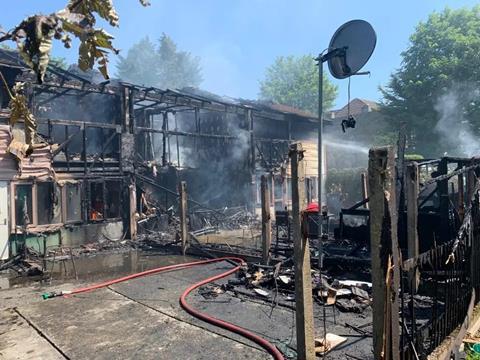Barnet Council alerts DLUHC to risks posed by timber-frame homes fitted with UPVC panels
Barnet Council has discovered that hundreds of its low-rise timber-frame homes were fitted with plastic cladding that poses an extreme fire risk, warning that the affected homes are “just the tip of the iceberg”.

The local authority found that 586 of its low-rise homes had been fitted with plastic UPVC cladding panels which can spread fire.
Barnet Council’s investigation was prompted after a fire destroyed a row of four terraced homes at Moss Hall Grove in North Finchley, in June 2023. One house was completely destroyed by the fire, while most of the adjoining houses were gutted by the fire.
The investigation which was conducted last summer by building consultants, Capital, found that there were fire stopping issues in the timber-frame buildings, and that the cladding constituted a “category 1 hazard”. A category 1 hazard is the highest level of risk, placing a legal duty on the council to take action.
>> See also: Kirklees council found non-compliant over 20,000 overdue fire safety actions
The homes in question were built with timber frames from the 1930s to the 1960s and were retrofitted with UPVC cladding panels in the 1980s.
The council believes that other homes across the country could contain the same type of cladding. As a result, it has alerted DLUHC, the Mayor of London and other local authorities about the issue.
The total estimated cost of the cladding remediation works is nearly £17m, while fixing the cladding on the 153 council-owned homes will cost £3.6m. The repairs are scheduled to commence next month.
Alongside this, it is offering the 426 freeholders and seven leaseholders a package of works to replace the cladding, as well as a loan and repayment plan to freeholders to manage the cost.
Deputy Council Leader and Cabinet Member for Homes and Regeneration, Councillor Ross Houston, said he feared other homeowners in similar properties across the country could be similarly affected by this type of cladding.
He said: “The council will cover the cost for replacing cladding on its social housing stock but homeowners will unfortunately need to fund remediation for their own properties. The cost of replacing the cladding on each property could be up to £23,000 so to help we are organising* a loan and a repayment plan for those who need it, but we’re really limited on what we can do.
“We believe the 580 affected homes in Barnet are just the tip of the iceberg across the country. We’re sharing details with other local authorities and DLUHC as clearly there is need for a national plan to raise awareness and work out how best to support homeowners.”
The government released figures at the end of January, which revealed that there are 3,972 residential buildings 11 metres and over in height identified with unsafe cladding.











No comments yet